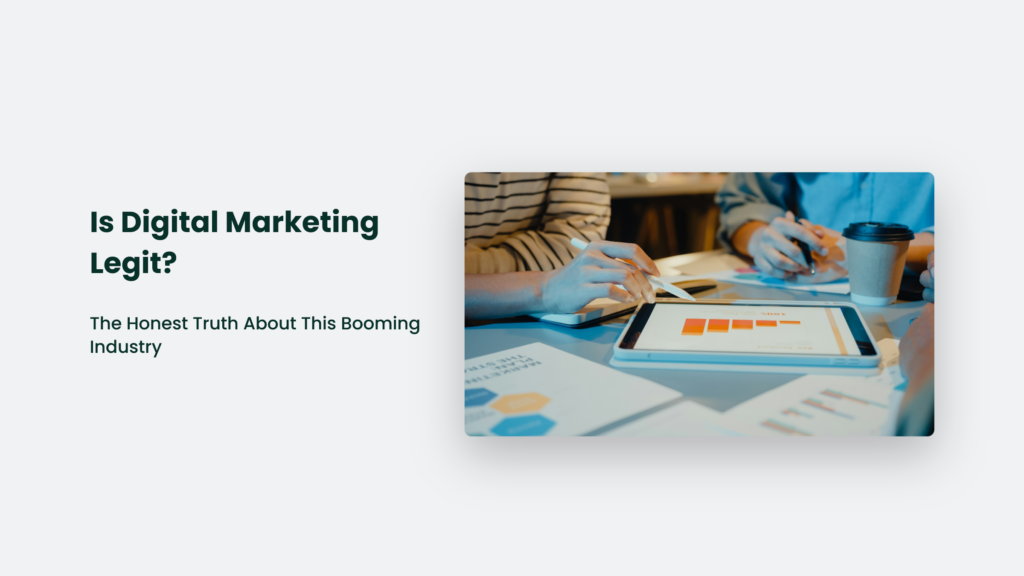Let’s cut through the hype and get real for a moment. You’ve probably heard whispers about digital marketing being the next big thing, the golden ticket to business success. But is it all just smoke and mirrors? Or is there some substance behind the buzzwords?
In this no-nonsense deep dive, we’re going to explore is digital marketing legit or just another passing fad. Buckle up, because we’re about to separate fact from fiction and give you the unvarnished truth.

The Digital Marketing Landscape: More Than Just Buzzwords
First things first, let’s define what we’re dealing with here. Digital marketing isn’t just about posting memes on social media or bombarding people with emails (though those can be part of it). It’s a comprehensive approach to promoting products, services, or brands through digital channels.
Promoting a business online through digital marketing is crucial for reaching a wide audience. However, achieving success is a gradual process that requires time, effort, and education on best practices.
These channels include:
- Search engines
- Social media platforms
- Websites
- Mobile apps
- And even emerging technologies like virtual reality
Adhering to digital marketing best practices is essential to avoid scams and achieve effective online promotion. These practices help establish credibility, set realistic expectations, and protect individuals from misleading promises and fraudulent tactics in the digital marketing landscape.
But is it actually effective? Let’s look at some cold, hard facts:
- 49% of businesses say that organic search brings them the best marketing ROI.
- Email marketing returns a whopping $44 for every $1 spent.
- 93% of all online experiences begin with a search engine.
These aren’t just random numbers pulled out of thin air. They’re backed by research and real-world results. At first glance, digital marketing seems legit. But let’s dig deeper.
The Good, The Bad and The Clickbait:
The Good: Why Digital Marketing Is Crushing It
Reach and Targeting: The Digital Goldmine
In the realm of digital marketing, a digital marketer plays a crucial role in leveraging reach and targeting capabilities effectively. With over 5 billion internet users worldwide, the potential audience is staggering. But it’s not just about casting a wide net; it’s about precision fishing in an ocean of opportunities.
Global Reach, Local Impact
Digital marketing transcends geographical boundaries, allowing businesses to connect with potential customers across the globe. A small boutique in Sydney can now sell its unique products to fashion enthusiasts in New York, London, or Tokyo. This global reach was once the exclusive domain of multinational corporations, but digital platforms have levelled the playing field.
Hyper-Targeting: The Marketing Sniper Rifle
The real power of digital marketing lies in its ability to target specific demographics, interests, and behaviours with laser precision. Gone are the days of hoping your billboard catches the right eye. Now, you can:
- Target by Demographics: Age, gender, income level, education, and occupation.
- Pinpoint Interests: Hobbies, favourite brands, and lifestyle choices.
- Analyze Behaviors: Past purchases, browsing history, and device usage.
This level of targeting allows for personalized marketing at scale. Imagine being able to show your ad for eco-friendly yoga mats specifically to environmentally conscious yoga enthusiasts aged 25-34 who have recently searched for fitness equipment. That’s the power of digital targeting.
The Data Advantage
Rich data fuel digital marketing’s targeting capabilities. Every click, view, and interaction leaves a digital footprint, providing marketers with invaluable insights. This data allows for:
- Predictive Analytics: Anticipating customer needs before they even arise.
- Behavioural Targeting: Tailoring messages based on past online behaviour.
- Lookalike Audiences: Find new customers who share characteristics with your best existing customers.
Cost-Effectiveness: Maximizing ROI in the Digital Age
One of the most compelling advantages of digital marketing is its cost-effectiveness, especially when compared to traditional marketing channels. By implementing best practices to maximize the effectiveness of digital marketing efforts, small businesses can compete with industry giants on a more level playing field. This aspect has democratized marketing, allowing small businesses to achieve significant business benefits.
Budget-Friendly Entry Points
Digital marketing offers flexible budget options that cater to businesses of all sizes:
- Pay-Per-Click (PPC) Advertising: You only pay when someone clicks on your ad, ensuring your budget is spent on engaged prospects.
- Social Media Marketing: Organic posts can reach thousands for free, while paid promotions can start from as little as a few dollars a day.
- Content Marketing: Creating valuable content can attract and engage audiences at a fraction of the cost of traditional advertising.
Scalability and Flexibility
Unlike traditional marketing methods that often require significant upfront investments, digital marketing allows for scalable and flexible spending:
- Start Small, Grow Big: Begin with a modest budget and scale up as you see results.
- Real-Time Adjustments: Quickly pivot strategies based on performance data, minimizing wasted spend.
- A/B Testing: Experiment with different approaches without committing large budgets.
ROI Amplification
Digital marketing often provides a higher return on investment compared to traditional methods:
- email marketing: According to some studies, email marketing can return up to $44 for every $1 spent.
- Content Marketing: Generates over three times as many leads as outbound marketing but costs 62% less.
- SEO: While it requires time and effort, organic search traffic can provide long-term value without ongoing ad spend.
Measurability: The Power of Data-Driven Decision Making
In the world of digital marketing, guesswork is replaced by precise measurement and analysis. Unlike traditional marketing methods, where impact can be difficult to quantify, digital campaigns offer unparalleled insights into performance and ROI. Search engine optimization (SEO) is a critical component of digital marketing that involves optimizing websites to rank higher in search engine results, subsequently driving organic traffic and increasing engagement and conversions.
Real-Time Analytics
Digital marketing platforms provide real-time data on campaign performance:
- Immediate Feedback: See how your ads or content perform within hours or minutes of launch.
- Dynamic Optimization: Make data-driven adjustments to improve performance on the fly.
- A/B Testing at Scale: Quickly test different ads, emails, or landing page versions to identify what resonates best with your audience.
Comprehensive Tracking
Every aspect of a digital marketing campaign can be tracked and analyzed:
- Customer Journey Mapping: Follow the path from initial awareness to final conversion.
- Attribution Modeling: Understand which touchpoints contribute most to conversions.
- Engagement Metrics: Measure clicks and time spent, pages viewed, and interactions.
ROI Calculation
Digital marketing makes it easier than ever to calculate the exact return on investment:
- Cost Per Acquisition (CPA): Know exactly how much you spend to acquire each customer.
- Lifetime Value (LTV) Analysis: Understand the long-term value of customers acquired through different channels.
- Revenue Attribution: Directly link marketing efforts to revenue generated.
The Bad: Challenges in the Digital Realm
Oversaturation: Standing Out in a Crowded Digital Landscape
As digital marketing has become more accessible and popular, the online space has become increasingly crowded. This oversaturation presents significant challenges for businesses trying to capture audience attention and stand out.
The Content Deluge
With millions of pieces of content being created and shared daily, breaking through the noise is harder than ever:
- Content Shock: Audiences are overwhelmed with information, decreasing engagement and attention spans.
- Quality vs. Quantity: The pressure to produce constant content can lead to a decline in quality.
- Algorithm Changes: Social media and search engine algorithms frequently change, affecting content visibility and reach.
Ad Fatigue and Banner Blindness
As users are bombarded with advertisements, they’re becoming increasingly adept at tuning them out:
- Ad Blockers: The rise of ad-blocking technology makes it harder to reach audiences through traditional digital ads.
- Decreased Click-Through Rates: Engagement rates are declining across many platforms as users become desensitized to ads.
- Increased Ad Costs: Competition for ad space drives up costs, particularly in popular niches.
Strategies for Standing Out
To combat oversaturation, marketers must:
- Focus on Niche Targeting: Identify and cater to specific audience segments.
- Prioritize Quality Over Quantity: Create high-value, unique content that resonates with your audience.
- Embrace New Formats: Experiment with emerging content types like interactive videos, AR experiences, or podcasts.
- Build Community: Foster genuine connections with your audience to create loyalty beyond content consumption.
Constant Change: Adapting to the Ever-Evolving Digital Landscape
The digital marketing world is characterized by rapid and constant change. What works today might be obsolete tomorrow, requiring marketers to be agile, adaptable, and always learning. A digital marketing consultant can play a crucial role in helping businesses navigate these complexities and stay ahead in the ever-evolving digital landscape.
Technological Advancements
New technologies are constantly emerging, reshaping how we approach digital marketing:
- AI and Machine Learning: These technologies are revolutionizing everything from ad targeting to content creation.
- Voice Search: The rise of voice-activated devices is changing SEO strategies.
- Augmented and Virtual Reality: These technologies open new avenues for immersive marketing experiences.
Social Media Platforms Evolution
Social media platforms and search engines are in a constant state of flux:
- Algorithm Updates: Major platforms like Google and Facebook frequently update their algorithms, affecting content visibility and ad performance.
- New Features: Platforms regularly introduce new features (e.g., Instagram Reels, Twitter Spaces) that marketers must quickly learn and leverage.
- Emerging Platforms: New social media platforms can quickly gain popularity, requiring marketers to adapt their strategies.
Changing Consumer Behaviors
User preferences and behaviours are evolving rapidly:
- Shift to Mobile: The increasing dominance of mobile devices requires a mobile-first approach to digital marketing.
- Privacy Concerns: Growing awareness of data privacy is changing how users interact with brands online.
- Short-Form Content: Platforms like TikTok have popularized short-form video content, influencing content strategies.
Strategies for Adaptation
To thrive in this environment of constant change, marketers must:
- Stay Informed: Regularly follow industry news and trends.
- Continuous Learning: Invest in ongoing education and skill development.
- Experimentation: Be willing to test new platforms and strategies.
- Agile Marketing: Adopt an agile approach that allows for quick pivots based on performance data and market changes.
Privacy Concerns: Navigating the Complex Web of Data Regulations
As digital marketing relies heavily on user data, the increasing focus on privacy and data protection presents significant challenges. Regulations like GDPR (General Data Protection Regulation) and CCPA (California Consumer Privacy Act) have reshaped how businesses collect, use, and store consumer data.
The Regulatory Landscape
Data privacy regulations are becoming more stringent and widespread:
- GDPR: Implemented in the EU but affecting any business dealing with EU citizens’ data.
- CCPA: California’s privacy law, with other states following suit with similar legislation.
- Global Trends: Countries worldwide are implementing their own data protection laws.
Impact on Digital Marketing
These regulations have far-reaching implications for digital marketers:
- Data Collection Limitations: Stricter rules on what data can be collected and how it must be obtained.
- Consent Requirements: Explicit user consent is needed for data collection and usage.
- Data Storage and Security: Increased responsibility for protecting user data from breaches.
- Right to be Forgotten: Users can request the deletion of their data.
Challenges for Marketers
Navigating this complex regulatory environment presents several challenges:
- Compliance Complexity: Maintaining and adhering to various regulations across different regions.
- Limited Data Access: Reduced ability to collect and use third-party data for targeting.
- Personalization vs. Privacy: Balancing the desire for personalized marketing with respect for user privacy.
- Trust Building: Convincing users to share their data in an environment of increased privacy awareness.
Strategies for Privacy-Compliant Marketing
To address these challenges, marketers are adopting new approaches:
- First-Party Data Focus: Prioritizing the collection and use of first-party data with user consent.
- Transparency: Clear about data collection practices and give users control over their data.
- Privacy by Design: Incorporating privacy considerations into marketing strategies from the outset.
- Contextual Advertising: Shifting towards contextual targeting rather than relying solely on user data.
- Educating Consumers: Helping users understand the value exchange in sharing their data.

The Clickbait: Separating Digital Marketing Scams from Reality
In the fast-paced world of digital marketing, it’s easy to get caught up in the hype. Sensational claims and promises of overnight success are commonplace, but the reality is often far more nuanced. Let’s dive deep into the world of digital marketing clickbait and separate the wheat from the chaff.
Another critical aspect to be aware of is business directory scams. These scams involve companies promising to list your business in prominent online directories to enhance visibility and SEO rankings. However, they often result in your business being listed on lesser-known websites with negligible traffic. It is crucial to conduct thorough research before making any payments for directory listings to avoid falling victim to these fraudulent practices.
The Allure of Quick Fixes
The Promise
Digital marketing gurus and self-proclaimed experts often peddle the idea of instant success:
- “10x Your Revenue Overnight!”
- “Become an Instagram Millionaire in 30 Days!”
- “The Secret SEO Trick Google Doesn’t Want You to Know!”
These clickbait headlines tap into our desire for quick, easy solutions to complex problems. They promise shortcuts to success that bypass the need for hard work, strategy, and patience. However, it is crucial to have control over one’s Google Ads account to assess performance and management of advertising funds.
The Reality
Sustainable success in digital marketing rarely comes overnight:
- Building a Strong Foundation: Effective digital marketing requires a solid strategy, well-defined goals, and a deep understanding of your target audience.
- Consistent Effort: Success often comes from consistent, long-term efforts rather than one-off tactics or “hacks.”
- Continuous Learning: The digital landscape always evolves, requiring marketers to constantly update their skills and knowledge.
The Myth of One-Size-Fits-All Solutions
The Promise
Many digital marketing products and courses claim to offer universal solutions:
- “The Ultimate Social Media Strategy That Works for Every Business!”
- “One Funnel to Rule Them All!”
- “The Perfect Email Template That Converts Every Time!”
These claims are appealing because they suggest that a simple, universal approach can solve complex marketing challenges.
The Reality
Effective digital marketing is highly context-dependent:
- Industry Variations: What works for an e-commerce business might not work for a B2B software company.
- Audience Differences: Different target audiences respond to different types of content and messaging.
- Platform Specifics: Each social media platform and marketing channel has its own best practices and user behaviours.
- Constant Evolution: What worked last year might not work this year due to algorithm changes, user behaviour, or market conditions.
Understanding the market value of digital marketing strategy services is crucial to avoid scams. Unrealistic promises and unverified claims can mislead clients, highlighting the need for transparency and proper training when evaluating potential marketing firms.
The Illusion of Passive Income
The Promise
Many digital marketing gurus sell the dream of “set it and forget it” marketing:
- “Create a Passive Income Stream with Automated Webinars!”
- “Build a Six-Figure Business on Autopilot!”
- “Make Money While You Sleep with This Email Sequence!”
These claims tap into the desire for financial freedom and a work-free lifestyle.
The Reality
While automation and passive income strategies can be part of a digital marketing approach, they rarely work in isolation:
- Ongoing Maintenance: Even “passive” income streams require regular updates, monitoring, and optimization.
- Initial Investment: Creating high-quality automated systems often requires significant upfront time and resource investment.
- Adaptation: These systems must be updated and refined as market conditions change.
- Personal Touch: Many successful digital marketing strategies still require a human element for relationship-building and problem-solving.
The Truth About Digital Marketing Success
Effective digital marketing requires:
- Strategic Planning: Developing a comprehensive strategy aligned with business goals.
- Audience Understanding: Deep knowledge of your target audience’s needs, preferences, and behaviours.
- Quality Content: Creating valuable, relevant content that resonates with your audience.
- Data-Driven Decision Making: Using analytics to inform and refine your strategies.
- Adaptability: Being willing to pivot based on performance data and market changes.
- Patience and Persistence: Recognizing that sustainable results often take time to achieve.
- Continuous Learning: Staying updated with the latest trends, tools, and best practices.
- Ethical Practices: Building trust with your audience through transparent and honest marketing.

The Numbers Don’t Lie: Digital Marketing by the Stats
If you’re still sceptical, let these statistics do the talking:
- 72% of marketers say content marketing increases engagement and leads.
- Companies using social media for marketing see a 119% improvement in ROI.
- Businesses that blog get 55% more website visitors than those that don’t.
These aren’t just vanity metrics. They translate to real business growth and revenue. But remember, success in digital marketing isn’t guaranteed. It requires skill, strategy, and, often, a bit of trial and error.
The Bottom Line: Is Digital Marketing Legit?
So, is digital marketing legit? The short answer is yes but with caveats. When done right, digital marketing can be a game-changer for businesses of all sizes. It offers unparalleled reach, targeting capabilities, and measurability. But it’s not a magic wand. It requires strategy, effort, and continuous learning. The key is to approach digital marketing with realistic expectations and a willingness to adapt.
Don’t fall for get-rich-quick schemes or promises of overnight success. Instead, focus on building a solid strategy, understanding your audience, and consistently delivering value. Remember, in digital marketing, authenticity trumps hype every time.
So keep it real, stay committed, and who knows? You might just find that digital marketing is not only legit but also the key to unlocking your business’s full potential.
Frequently Asked Questions:
How long does it take to see results from digital marketing?
It varies depending on the strategies used and your industry. SEO typically takes 3-6 months to show significant results, while paid advertising can yield immediate returns. Content marketing often requires 6-12 months of consistent effort before seeing substantial payoff.
Is digital marketing only for big businesses?
Not at all! Digital marketing can be scaled to fit businesses of all sizes. In fact, it often levels the playing field, allowing smaller businesses to compete with larger corporations.
Do I need to be on every social media platform?
No, it’s better to focus on the platforms where your target audience is most active. Quality engagement on a few platforms is more effective than a scattered presence across all of them.




